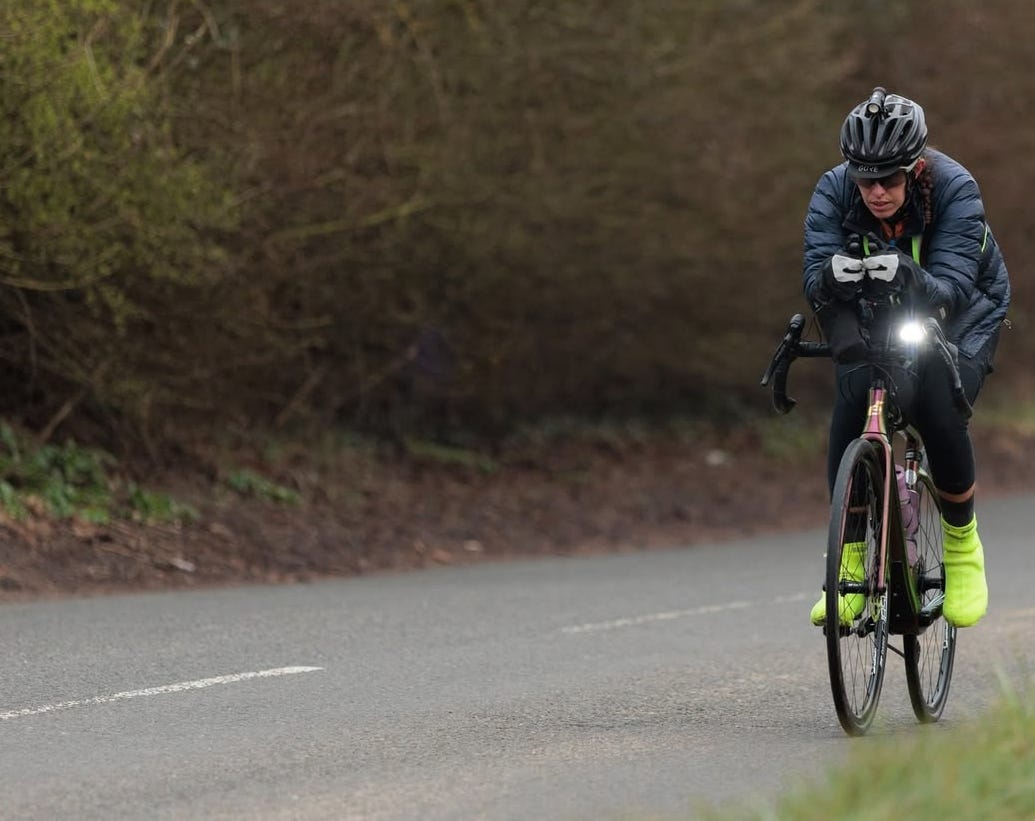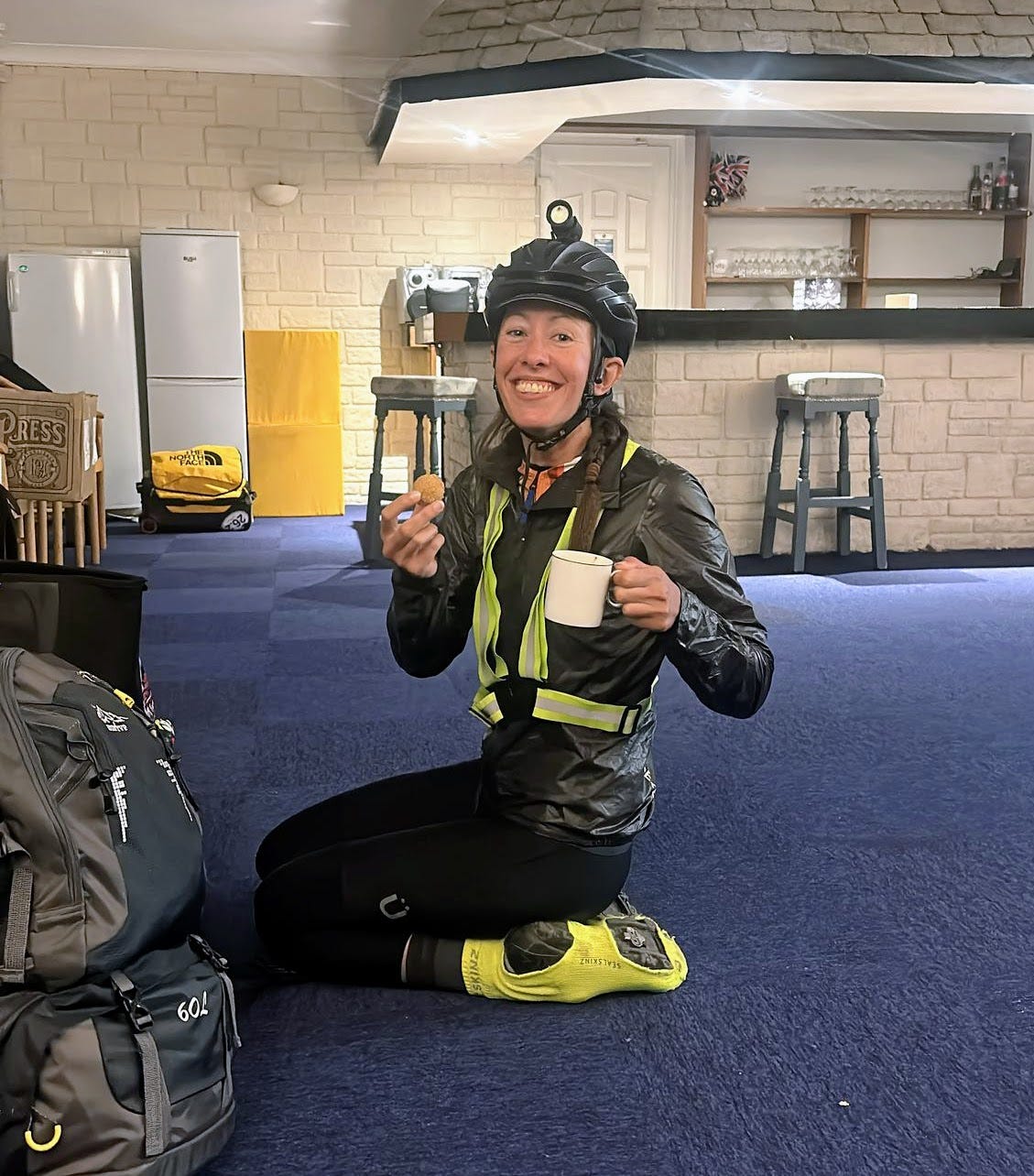
It was just past 5am when the sky began to stir with the first hint of morning light. But instead of a brilliant white, it was a deep crimson band that stretched across the horizon—faint enough to make me question if it was real, yet vivid enough to assure me the end was near. Soon, I’d no longer be trapped in endless 18km circles. No longer reaching into a pouch of soggy jelly babies. No longer watching rider after rider after rider fly past as I crawled along the tarmac. Soon, it would all be over.
These were my thoughts 19 hours into the Equinox Omniloop, a 24 hour time-trial that sees riders complete fixed-route loops in order to accumulate points.
I’d gone into the race knowing that I wasn’t on top form. A 200km Audax a couple of weeks earlier had confirmed that my legs definitely weren’t where I needed them to be, and my head was feeding the usual narrative of self-doubt that I’ve become so accustomed to.
The truth is: I knew that I wasn’t in the running to offer any kind of serious competition, but I wanted to get out there and have some fun: ride my bike, see some pretty views, and get overly excited by every single sighting of a newborn lamb.
The reality was very different. From the moment we left the start line I knew something wasn’t quite right. I was already falling behind the pack of ten women, my legs struggling to find the right gear. Not long after, riders who started in the later waves quickly started overtaking.
“This is fine” I shrugged. “I’m not here to win”.
And whilst that was true, it would have been nice to at least feel as though my three weeks in Tenerife had counted for something.
As the miles ticked on, my legs still refused to fire. Shallow gradients immediately forced me into the little ring, my breathing laboured as though sucking air through a straw.
“Something isn’t right”.
I looked down at my Garmin to see my current power output spat out on the display in front of me. 90 watts. At least half of what I would normally be able to hold on a climb like this.
Pushing harder was thankless. I simply had nothing to give. It was as though my leg muscles refused to activate and were quite content with spinning loosely around the pedals.
“Twenty-four hours of this” I thought, begrudgingly. A long time to cycle in circles while mentally tearing myself to shreds. “You’re a terrible cyclist and now everyone else knows it too”.
This kind of self-doubt is nothing new. I write about it an embarrassing amount. In fact, I write about it in pretty much every account of every cycling event I’ve ever participated in, ever. And no matter how many times I succeed or finish or accomplish what I set out to do, that little voice never goes away.
“Why aren’t you better?”
“Why aren’t you faster?”
“Why aren’t you stronger?”
“Why aren’t you good enough?”
It’s a painful narrative to hear on repeat. It’s even more painful when the narrator is you.
What’s worse is I then start to convince myself that everyone else believes the narrative.
“She doesn’t belong here”
“Who does she think she is?”
“She needs to stop riding ultras”
And for a brief moment, I believe it too. I think about hitting the brakes and turning back to HQ, fighting to find the purpose in continuing with something that feels so hard. I think about the newsletter I’ll have to write, explaining to everyone that I failed and that maybe I’m not cut out for long-distance after all. I think about the brands that have supported me, and having to apologise for being such a phony.
And then I think about the woman who has been silently following my journey, echoing every setback, every hurdle, every fear. I think about her thirst for adventure and her dream of joining her first race. I think about the stories she tells herself, about how she doesn’t think she’s ready, or people will laugh at her, or that she’ll be too slow. I think about her seeing the speeds and distances and power of other riders, and how her confidence is quickly waning. I think about her convincing herself she’s not made for this world and delicately putting her dream back into its box. And I think about what I’d tell her.
And then I pause
.
.
.
And instead I tell myself.
I wasn’t sure what I was going to write about today. I knew I wanted to share my thoughts and reflections on Saturday’s race, but I never expected it would lead to something as raw and vulnerable as this. Events like these inevitably stir up a lot of inner demons, and writing has become my way of working through it all.
I could have quite happily stopped riding after it got dark. The fatigue was creeping in, and the cold air was starting to bite. But in the back of my mind, I held onto the hope that somewhere, someone was watching. Someone who might see me, struggling but still moving forward, and think, ‘If she can do it, so can I.’
The world of ultra-distance cycling is already an extremely niche circle. Especially when it comes to women. We should be doing everything we can to make it more accessible, more inclusive, and more appealing. And if that means continuing to join events despite knowing I’ll never see the top of the leaderboard, then so be it 🚴🏻♀️
If you enjoy reading this newsletter each week, consider supporting my work with an annual subscription. I pour a huge amount of time, energy, and heart into my writing, and your support helps me keep showing up.
I know that money can be tight, and I never want this to feel like an obligation. But if you find value in what I share, an annual subscription is a great way to chip in without the monthly reminder. Pay once, forget about it, and know that you’re helping keep this little corner of the internet alive.
Thanks for being here—I appreciate you more than you know. 💜






Well done Jess for not giving up and being so resilient. Loved reading your story as usual and with your perseverance I’m sure you will better on your next ultra. Speaking of which what will be and when is your next one?
First of all, congratulations on completing the race!
Secondly, thank you for this piece. What a gift.
Already looking forward to the next tales of your adventure.